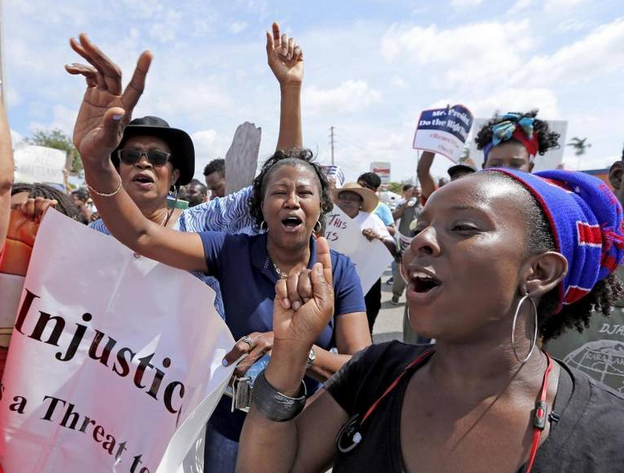As Haitians across the United States worry they may lose protection from deportation, supporters and activists stepped up calls Wednesday for the Trump administration to extend protection for another 18 months.
The rising urgency comes as the community faces an imminent deadline. Department of Homeland Security Secretary John Kelly has until Tuesday to decide whether he will extend the Temporary Protected Status program — as a broad group of organizations have asked — for Haitians or end the program as his top immigration official recommended last month in a memo.
“Not extending TPS would be devastating to hundreds of thousands of Haitians, and it would set back recovery and rebuilding efforts [in Haiti] for years to come,” said Rep. Ted Deutch, D-Boca Raton. “It’s a humanitarian decision and should not be part of some broader debate about immigration policy at this moment in time.”
Many fear that the Trump administration’s decision to extend or terminate Temporary Protected Status, or TPS, for Haiti will be determined more by immigration reform than considering whether the 58,000 Haitians in the program continue to need protection because conditions in Haiti remain grim.
On Wednesday, during two separate telephone conference calls, advocates who are urging an 18-month extension argued that sending back tens of thousands of Haitians, each supporting on average at least five people back home, would have rippling economic effects.
“This is really the first clear indication we’re going to get on what type of decisions this president is going to be making on humanitarian issues, and this is going to be an important one,” said Melanie Nezer, vice president of policy and advocacy at HIAS, formerly the Hebrew Immigrant Aid Society.
Nezer said she was “concerned about the alternative facts” that were presented by U.S. Citizenship and Immigration Services’ Acting Director James McCament in his April 10 memo to Kelly recommending termination. McCament argued that “Haiti has made significant progress in recovering” from the devastating Jan. 12, 2010, earthquake, which qualified Haiti for the TPS designation. He said Haitians should only be allowed to remain in the U.S. until January — six months after the program’s current July 22 expiration day.
Other activists also criticized reports that Homeland Security has been conducting a probe to determine if Haitian TPS holders had criminal histories, and whether they were obtaining public benefits, which they are not eligible to receive.
Last week, The Associated Press published portions of leaked internal emails from USCIS policy chief Kathy Nuebel Kovarik telling staff members to look for stories about rebuilding in Haiti and reports of criminal activity by those with TPS.
“Even though it’s only a snapshot and not representative of the entire situation, we need more than ‘Haiti is really poor’ stories,” Kovarik wrote on April 28, the AP reported.
On Wednesday, the National Immigration Law Center and the Undocublack Network, a social justice group, announced they will file a Freedom of Information Act request for more information about the government’s actions, which they called a “fishing expedition.”
“This call for data feels like a throwback to the racist, anti-welfare politics from decades ago,” said Reshma Shamasunder, deputy director of programs at the National Immigration Law Center. “This latest scandal from the Trump administration is part of a larger, xenophobic nasty deportation agenda. Whether it’s by enacting bans, building walls or stripping work authorizations, the Trump administration is using every tool at its disposal to divide and diminish the immigrant community.”
Homeland Security acknowledged in press reports compiling evidence on the crimes but said it would not be used in its determination.
The call for extension has garnered bipartisan support among U.S. lawmakers and state officials in Florida, New York and Massachusetts especially. Sen. Bill Nelson, D-Fla., who had already written Kelly in support of the extension, sent another letter Wednesday emphasizing the Haitian government’s request to extend the benefit. Haiti, Nelson said, had only recently formed a government after long-delayed elections and prolonged political crisis, and ending TPS too soon would be disruptive.
Boston Attorney General Maura Healey and Massachusetts state Sen. Linda Dorcena Forry also sent Kelly a letter this week urging the extension, while the Greater Miami and the Beaches Hotel Association said it was also joining the call. Last week, Florida Gov. Rick Scott and Haiti’s foreign minister both met separately with Kelly, who could make a decision this week, activists said.
Jasmine Huggins, senior policy and advocacy officer for Church World Services, which has been operating in Haiti for 50 years, said ending TPS is contrary to the needs of Haiti right now. Citing recent Haitian government humanitarian reports, Huggins noted that even before Hurricane Matthew struck in October, the country was already struggling with a food crisis prompted by a three-year drought. Recent rains have only made an already desperate situation worse.
“The remittances that families are now providing from their work and labor in the United States is absolutely critical for the families who have lost their income in Haiti as a result of these multiple crises,” she said.
WHAT IS TPS?
Designated by the Department of Homeland Security, Temporary Protected Status or TPS is provided to nationals of countries when the conditions in the country make return dangerous or impossible. This is usually devastating natural disasters or civil strife. In certain circumstances, it is also designated when the country is unable to handle the return of its nationals adequately. The designation is given by the Department of Homeland Security.
What does it allow?
Protection from deportation. An individual with TPS can live and work legally in the United States as long as they have renewed their status. They can also obtain travel authorization.
How many countries currently receive TPS designation?
There are 12 countries including Haiti, El Salvador, Honduras and Nicaragua. Liberia’s designation, due to Ebola, recently expired.

